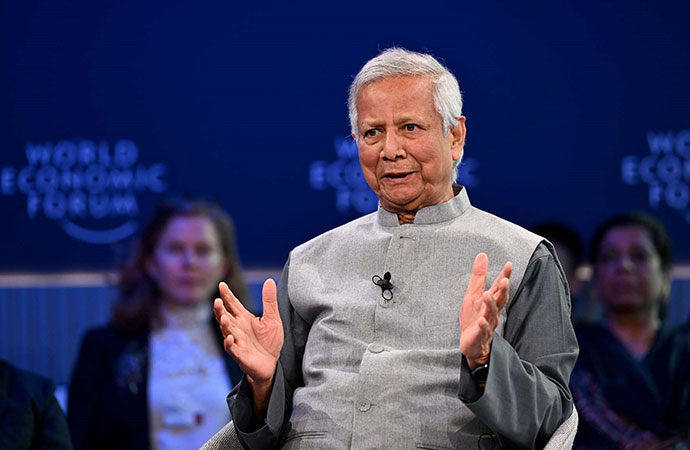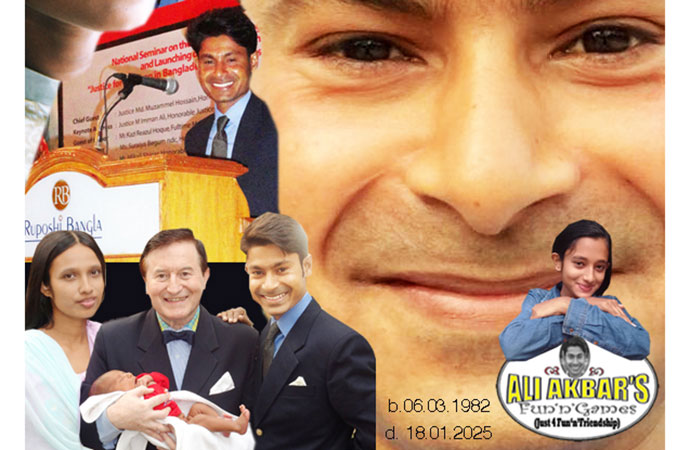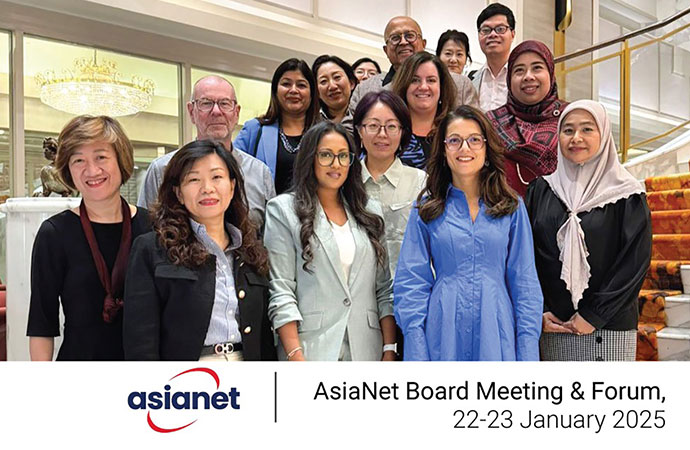Global

Chief Adviser Professor Muhammad Yunus joined conversation with the founder of the World Economic Forum Klaus Schwab in Switzerland. Photo: PID
On a typically hectic day at the World Economic Forum (WEF) in the Swiss resort town of Davos on Wednesday, Chief Adviser Muhammad Yunus called on Bangladesh's international allies to aid in the recovery of substantial amounts of money stolen from the country by the group of oligarchs who controlled Bangladesh under the deposed Awami League government, and welcomed investors to reap the opportunities offered by Bangladesh 2.0.
The World Economic Forum is held at the Swiss mountain town of Davos every year in January.
Chief Adviser Yunus had attended the event about a dozen times in the past. In the past his talks featured mostly on the power of social businesses, the microfinance industry and how it was doing wonders and the Three Zeros, his great idea to fix a self-destructive civilisation.
The social businesses alone now account for ten million enterprises, representing a $2.3 trillion economy.
This time Prof Yunus was here in a different role, said his Press Secretary Shafiqul Alam, as a head of government.
"He is still one of the most sought after speakers here. But this time he rarely talks about his core ideas," Alam said, adding that Dr Yunus came with a new real life story of how young people in Bangladesh brought down a "dictator", how their ideas are creating a new Bangladesh and how the country is getting rebuilt.
The chief adviser urged the global leaders to send top experts, think tanks, journalists, and international organisations to Bangladesh to look into how the "plain and daylight robbery" was committed in Bangladesh during Sheikh Hasina's "corrupt" 16-year-long rule, Chief Adviser's Deputy Press Secretary Abul Kalam Azad Majumder said.
Lutfey Siddiqi, Special Envoy to Chief Adviser, Lamiya Morshed, Principal Coordinator on SDGs Affairs (Senior Secretary); and Ambassador Tareq Md Ariful Islam, Bangladesh Permanent Representative in Geneva, were among others, present in the meetings, said Azad Majumder.
Lutfey Siddiqi briefed German Minister Wolfgang Schmidt regarding the government's efforts in recovering the stolen money and said that the government had formed an Asset Recovery Committee and a Taskforce headed by the Bangladesh Bank governor in this regard.
He said that the government had targeted the top 20 money launderers initially to recover their stolen money.
Highlighting the interim government's efforts to build a corruption-free Bangladesh, Chief Adviser Prof Yunus told the German Minister, "When we talk about new Bangladesh, we also talk about clean Bangladesh."
The chief adviser sought German support to this effect and also discussed potential fields of economic cooperation with the German minister.
The German minister said a new German business delegation will visit Bangladesh in April.
Professor Yunus said that Bangladesh intends to create an economic platform, also involving India, Nepal, and Bhutan, to explore the hydroelectric potential of Nepal. "Nepal is really ready to sell, and Bangladesh is a good market. It can create a lot of jobs and lessen dependence on fossil fuels," he said.
The chief adviser also discussed elaborately with Swiss Federal Councillor Ignazio Cassis regarding the issues of mutual interests, including economic cooperation and climate financing.
He requested Switzerland to support Bangladesh in its carbon retention efforts in the world's largest mangrove forest, the Sundarbans.
Dr Yunus also urged Switzerland to invest in Bangladesh to cash in on the potentials of Bangladesh's youth, with young people under 27 years making up half the country's population.
The CA briefed the global leaders about the reform plans of Bangladesh's interim government and the plan for the next general election.
In his meetings with the German minister and Swiss councillor, he also discussed Bangladesh's energy security.
During his meeting with Belgium's King Philippe and Congolese President Felix Tshisekedi, the Chief Adviser was informed how a microcredit program launched by a group headed by a Belgian prince helped expand the size of tropical forest reserves in the African country.
Prince Emmanuel de Merode, whose group launched microcredit in Congolese conflict-prone areas, said the Congolese forest was now double the size of Britain after conflict microcredit created 21,000 jobs there - some 11 percent of them are former combatants. He said microcredit programs have played a big role in bringing peace to parts of the region.
The chief adviser also discussed with Thailand Prime Minister Shinawatra the Rohingya crisis and areas of economic cooperation, including shipping. "We want to resolve the Rohingya crisis quickly as more and more Rohingyas are coming to Bangladesh," he said.
Shinawatra, one of the youngest Prime Ministers in the world, expressed her interest in increasing youth engagement between the two countries following the July revolution in Bangladesh.
Professor Yunus said the father of the Thai Prime Minister, Thaksin Shinawatra, was a big fan of microcredit and social businesses.
The chief adviser briefed the Thai premier about the Three Zeros idea, which he said aimed at rescuing a self-destructive civilisation by reducing poverty, wealth concentration, unemployment, and carbon emissions.
The CA told Shinawatra that currently there are about 5000 Three Zeros clubs in 58 countries of the world.
The Thai prime minister noted the Bimstec summit will be held in Bangkok in April this year.
Dr Yunus said he looks forward to taking over as chairman of the Bimstec during the planned summit of the organisation.
Bimstec comprises seven countries of the Bay of Bengal region: Bangladesh, Bhutan, India, Myanmar, Nepal, Sri Lanka and Thailand.
It pursues regional cooperation in seven broad sectors: agriculture and food security; connectivity; environment and climate change; people to people contact; science, technology and innovation; security; and trade, investment and development, said the Bimstec headquarters on Monday.
The cooperation also covers eight sub-sectors: blue economy, mountain economy, energy, disaster management, fisheries and livestock, poverty alleviation, health and human resource development.
The Chief Adviser also sought Thailand's support for Bangladesh to become a sectoral dialogue partner of Asean and in turn become a full member of the body.
Seeking the ECB's support
Dr Yunus sought the assistance from European Central Bank President Christine Lagarde to recover billions of dollars stolen from the country during Sheikh Hasina's "dictatorship."
"It was a massive highway robbery," the CA said, adding that the oligarchs first took over banks and then took loans, which they never paid back.
Dr Yunus engaged with global leaders, seeking support to bring back stolen money.
Lamiya Morshed, SDGs Affairs Principal Coordinator, and Ambassador Tareq Md Ariful Islam, Bangladesh Permanent Representative in Geneva, also joined the meeting.
Dr Yunus told Christine Lagarde, also a former chief of the International Monetary Fund (IMF), that some 17 billion dollars alone were taken out from the country's banking system by "oligarchs close to the dictatorship" and 16 billion dollars were siphoned off annually during the 15 years of Hasina rule.
Lagarde said she would support the interim government's move to recover the money, and recommended that Bangladesh should also take help from the IMF to recover and repatriate the money back home, said CA's Deputy Press Secretary Abul Kalam Azad Majumder.
During the talks, they also discussed the July Uprising and Bangladesh's reform initiatives. Lagarde also voiced her support for Bangladeshi educational institutions.
Assurances from Bretton Woods
Managing Director of Operations at the World Bank Anna Bjerde reiterated the global lender's support to the interim government for rebuilding Bangladesh.
"I want to express our support... count on us for whatever support you want," she told Chief Adviser Prof Muhammad Yunus during a meeting on the sidelines of the World Economic Forum.
The World Bank Managing Director for operations said the bank would like to extend its support to Bangladesh in the second half of the year, Chief Adviser's Deputy Press Secretary Abul Kalam Azad Majumder told our sister newsagency UNB.
During the talks, they spoke briefly on the July Uprising, reform initiatives of the interim government and the state of the Bangladesh economy.
Lamiya Morshed, SDGs Affairs Principal Coordinator of the Bangladesh government, and Ambassador Tareq Md Ariful Islam, Bangladesh's permanent representative to Geneva, also attended the meeting.
An important update
UN High Commissioner for Human Rights Volker Türk also happened to be among the attendees, and said the UN fact-finding mission on the atrocities during the July-August uprising is in a final stage and their report will be released by mid-February.
He made the comments during a meeting with Bangladesh Chief Adviser Professor Muhammad Yunus on the sidelines of the World Economic Forum annual meeting in Davos, said Chief Adviser's Deputy Press Secretary Abul Kalam Azad Majumder.
Türk said the report would also be shared with the Bangladesh side ahead of its publication from the UN rights office in Geneva.
The fact-finding team is mandated to establish facts, identify responsibilities, analyze root causes, and make concrete recommendations for Bangladesh to address past human rights violations and prevent their recurrence.
Dr Yunus thanked the UN rights office for investigating the crimes committed during the student-led uprising. He said reports of the six major independent commissions would also come out at around the same time.
These reports might serve to complement each other, they observed.
The chief adviser urged the UN human rights chief for his support in resolving the Rohingya crisis, which has worsened in recent months following the influx of tens of thousands of new refugees from Myanmar.
While assuring of his full support, Türk said that he was in conversation with relevant stakeholders, including UN special envoy on Myanmar, Julie Bishop, in this regard.
The deep human rights crisis in Myanmar needs the world's attention, Turk also said, after his meetings with key leaders including the Special Envoy on Myanmar for talks on the urgent need for solutions and a coordinated response that prioritises peace and human rights.
Yunus called for creating a UN-overseen safe zone inside Myanmar's Rakhine side in an effort to stop the fresh influx of Rohingyas.
The chief adviser referred to the upcoming high-level conference on the Rohingya crisis, saying it will bring global focus to one of the worst humanitarian crises.
Türk agreed that such a conference is very important to bring back the lost focus of the international community to the crisis.
Port developers show interest
The United Arab Emirates-based DP World and Denmark-based A.P. Moller-Maersk, on Thursday expressed interests in making big investments in Bangladesh's shipping industry to help the country build new ports along the coast of the Bay of Bengal and become a major global export hub.
A.P. Moller - Maersk is a Danish shipping and logistics company while DP World is a leading provider of smart logistics solutions, enabling the flow of trade across the globe.
The two leading companies came up with the proposals when Sultan Ahmed Bin Sulayem, Group Chairman and Chief Executive Officer of DP World, and Robert Maersk Uggla, Chair of A.P. Moller-Maersk, met Chief Adviser Professor Muhammad Yunus in the Swiss city during the World Economic Forum annual meeting.
Dr Yunus invited the DP World and A.P. Moller-Maersk officials to visit Dhaka with concrete investment proposals.
"We have to build a series of ports along the coast of the Bay of Bengal to use our full potential as a regional business hub," said the Chief Adviser, welcoming FDI for capacity building of Bangladesh ports.
The DP World CEO said they want to invest in New Mooring Container Terminal, aiming to reduce congestion in Chattogram Port, reduce emissions and boost the efficiency of the port.
The CEO of the UAE-based logistics company expressed optimism that investment in the New Mooring Container Terminal would help Bangladesh attract more Foreign Direct Investment (FDI) and reduce pollution.
It happened in every country where DP World invested, Sulayem told the Chief Adviser, adding that they also wanted to invest in Bangladesh in 2022 but were snubbed by the Awami League government.
Sulayem said that they also want to introduce a digital online customs procedure in Chittagong Port, which would help reduce corruption drastically. He said that they also want to invest in Inline Container Depots in Bangladesh.
The chief adviser told Sulayem that Bangladesh wants to make Chittagong Port more efficient and build more ports along the coast of the Bay of Bengal.
"We have to do it as our future lies with the Chittagong Port. We want to make it the biggest port in the region," said the Chief Adviser.
The chief adviser said that Bangladesh wants to increase the efficiency of Chittagong Port, as the country believes it can be a regional hub for exports handling containers for Northeast Indian states and Nepal and Bhutan, among others. "We have to do it fast because time is a cost," said Dr Yunus
Danish company A.P. Moller - Maersk chair Robert Maersk Uggla said they want to invest in Laldia container terminal, near Chattogram Port, and transform it into a green port with their technical support.
Robert Maersk Uggla said they implemented similar projects in Morocco and Oman. The Salalah Port of Oman has become one of the best ports in the world with their investment, Uggla told the Chief Adviser.
The best messenger for Bangladesh 2.0
The Chief Adviser continued his broader engagements with around a dozen more engagements on Thursday, the third day since his arrival in Davos on January 21. The Forum has brought together governments, businesses and civil society members to improve the state of the world.
It was seen as an ideal platform to sell the message of Bangladesh 2.0, and the CA also held meetings with Sir Nick Clegg, President, Global Affairs of Meta Platforms Inc; Agnes Callamard, Secretary-General of Amnesty International, Thomas Eymond-Laritaz, founder and CEO of HIGHGATE (Strategic Advisory Firm), Hugh Evans, CEO, Global Citizens and Prof. Klaus Schwab, founder, World Economic Forum. It was easy to see that the weight of the CA's personal profile among other world leaders, some of whom queued up to see him.
Global media outlets - Reuters, Financial Times and CNBC International anchor Tania Bryer, interviewed the Chief Adviser.
This year's WEF was held under the theme of "Collaboration for the Intelligent Age" and it welcomed close to 3,000 attendees from over 130 countries.
The gathering arrived with uncertainty looming large over the international system, with new leaders coming into office and conflict persisting in multiple regions.
World leaders as well as top private sector voices and leading civil society experts were meeting to drive dialogue and catalyse durable solutions to shared challenges.
President of the European Commission Ursula von der Leyen delivered a special address during the opening ceremony of the Annual Meeting. "The world today is still nearly as connected as ever," she stated. "But it has also started fracturing along new lines."
Von der Leyen urged private and public sector leaders working together, noting that it is in "no one's interest to break the bonds of the global economy."
Chinese Vice-Premier Ding Xuexiang called on governments to uphold the institutions of multilateralism and warned against the increasing use of protectionist policies. "Trade wars have no winners," he stated.
In a special address, German Chancellor Olaf Scholz, who also met the CA on his first day there (see next story) detailed efforts to strengthen Europe as the global geopolitical landscape gets increasingly complex.
"Predictability, honesty and reliability are having an increasingly difficult time," he said, adding that at the same time the world is becoming more "complicated and complex."
In a conversation with World Economic Forum President and CEO Børge Brende, Qatari Prime Minister and Foreign Minister Mohammed Bin Abdulrahman Al Thani discussed the latest developments in the Middle East.
Topics of discussion included political shifts in Lebanon, the Gaza ceasefire deal and the "new chapter" for Syria following the fall of the former regime.
The CA's main message was to invited the global investors to invest in Bangladesh in a bigger way, as the country is ready to enjoy enhanced trade and investment ties with the rest of the world. He relentlessly harped on the message and sacrifices of the July Uprising, and the improved business and investment climate it portended.
"We have always been saying Bangladesh is ready for an enhanced business," Chief Adviser's Press Secretary Shafiqul Alam told UNB, highlighting Dr Yunus' extensive engagements on the sidelines of the World Economic Forum annual meeting in the Swiss city.
Alam highlighted the prevailing business and investment friendly environment with enhanced port capacities in the country which helps Bangladesh to become another exports hub.
The beauty of the World Economic Forum annual meeting is that top executives of global organisations including prominent presence of private sector leaders interact with the heads of the government and states, said the Press Secretary, pointing to the Chief Adviser's extensive engagements in Davos.

























Leave a Comment
Recent Posts
Pedaling Through the Mangroves ...
The journey from the bustling streets of Barishal to the serene, emera ...
Why the Interim Government mus ...
Two weeks out from what is expected to be a red letter day in the figh ...
Doesn’t matter who thinks what about Bangladesh deci ..
The Other Lenin
US President Donald Trump said his administration
Govt moves to merge BIDA, BEZA, BEPZA, MIDA